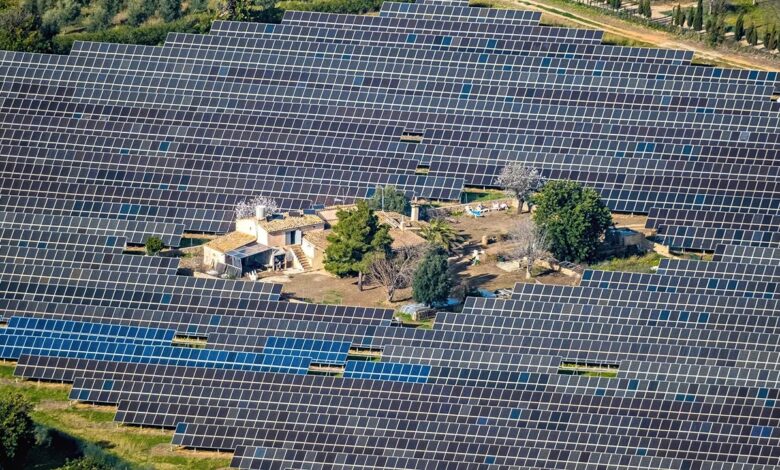
The growth of renewable energy in Spain stands as a global success story, showcasing the country’s commitment to a sustainable future. Over the past two decades, Spain has emerged as a leader in harnessing renewable energy sources like solar, wind, and hydroelectric power. This transition is driven by government initiatives, innovative technology, and a collective effort to reduce carbon emissions while ensuring energy independence.
This article explores the multifaceted aspects of the growth of renewable energy in Spain, highlighting its economic, environmental, and societal impacts. From large-scale solar farms to offshore wind projects, Spain’s progress serves as a model for other nations aiming to achieve their sustainability goals.
Read More: The Growth of Renewable Energy in Spain
Historical Overview of Renewable Energy in Spain
The historical context sets the foundation for understanding the growth of renewable energy in Spain and its evolution over the years.
Spain’s journey began in the early 2000s with a strong push for renewable energy development. Policies such as feed-in tariffs and investment incentives encouraged growth in solar and wind energy sectors. Over time, these measures transformed Spain into a global leader in clean energy production.
Government Policies Supporting Renewable Energy Growth
The role of government policies is pivotal to the growth of renewable energy in Spain, fostering innovation and investment.
Spain’s Renewable Energy Plan and National Energy and Climate Plan have set ambitious targets for renewable energy adoption. These initiatives include subsidies, tax incentives, and regulations to encourage private investment and support research in sustainable technologies.
Solar Energy’s Contribution to Spain’s Renewable Landscape
Solar energy exemplifies the significant growth of renewable energy in Spain, positioning the country as a leader in solar technology.
Spain’s abundant sunlight and advanced photovoltaic (PV) systems have enabled large-scale solar farms. Iconic projects like the Gemasolar plant have demonstrated Spain’s capability to harness solar energy efficiently, contributing to its renewable energy mix.
Wind Energy: A Pillar of Spain’s Renewable Success
Wind power underscores the remarkable growth of renewable energy in Spain, with extensive onshore and offshore wind farms.
Spain ranks among the top wind energy producers in Europe, with regions like Galicia and Castile-La Mancha leading the charge. Technological advancements in turbine design and energy storage have further enhanced the efficiency and reliability of wind power.
Hydropower’s Role in Spain’s Energy Transition
Hydropower highlights a long-standing component in the growth of renewable energy in Spain, complementing newer technologies.
Spain’s vast network of rivers and reservoirs provides ample opportunities for hydroelectric projects. These systems deliver consistent and clean energy, ensuring stability in the national grid during fluctuations in solar and wind energy production.
Biomass and Geothermal Energy Development in Spain
The integration of biomass and geothermal energy contributes to the diversified growth of renewable energy in Spain.
Biomass plants utilize agricultural and industrial waste to generate power, reducing environmental impact. Geothermal energy, though less prominent, offers potential for expansion, especially in regions with significant geothermal activity.
Technological Innovations Driving Renewable Energy Growth
Innovation is a driving force behind the growth of renewable energy in Spain, ensuring efficiency and sustainability.
Spain’s research institutions and tech firms are developing cutting-edge solutions in energy storage, grid management, and smart technologies. These advancements optimize renewable energy use, making it more accessible and cost-effective.
The Economic Impact of Renewable Energy Growth
Economic benefits highlight the transformative effects of the growth of renewable energy in Spain on national and regional levels.
The renewable energy sector generates thousands of jobs, attracts international investments, and reduces dependency on imported fossil fuels. These factors strengthen Spain’s economy and position it as a leader in the global energy transition.
Spain’s Offshore Wind Energy Potential
Offshore wind energy represents a new frontier in the growth of renewable energy in Spain, leveraging the country’s coastal resources.
Spain’s innovative floating turbine technology allows for wind farm installations in deeper waters. These projects promise substantial energy output and minimize environmental impact, further diversifying the renewable energy portfolio.
The Role of Renewable Energy in Spain’s Climate Goals
Spain’s commitment to climate targets underscores the importance of the growth of renewable energy in Spain in reducing emissions.
The nation aims to achieve carbon neutrality by 2050, with renewables playing a central role. By transitioning away from fossil fuels, Spain significantly contributes to global efforts to combat climate change.
Challenges in Scaling Renewable Energy in Spain
Obstacles reveal the complexities behind the growth of renewable energy in Spain, requiring innovative solutions.
Grid integration, land-use conflicts, and intermittent energy generation pose challenges. Addressing these issues through policy reforms, technological advancements, and community engagement is critical for sustained growth.
Community-Led Renewable Energy Projects in Spain
Local initiatives illustrate the inclusive aspect of the growth of renewable energy in Spain, empowering communities.
Community-owned solar farms and cooperative wind projects encourage public participation in energy generation. These initiatives foster awareness, reduce energy costs, and promote social equity in the energy transition.
International Collaborations and Investments in Spain
Global partnerships highlight the interconnectedness of the growth of renewable energy in Spain with the international community.
Spain collaborates with organizations like the European Union and private investors to accelerate renewable energy projects. These partnerships bring resources, expertise, and visibility to Spain’s renewable energy sector.
Renewable Energy Storage Solutions in Spain
Energy storage is critical to the continued growth of renewable energy in Spain, ensuring reliability and efficiency.
Spain invests in advanced battery technologies, pumped hydro storage, and hydrogen solutions to store excess energy. These systems balance supply and demand, optimizing renewable energy usage.
Spain’s Role in Europe’s Renewable Energy Transition
Spain’s leadership reflects the broader implications of the growth of renewable energy in Spain for the European Union.
As one of the largest renewable energy producers in Europe, Spain contributes significantly to the EU’s collective climate goals. Its achievements set an example for other member states to follow.
Future Trends in Spain’s Renewable Energy Sector
Emerging trends highlight the evolving nature of the growth of renewable energy in Spain, paving the way for future innovations.
Advancements in AI, blockchain, and decentralized energy systems promise to revolutionize how renewable energy is generated and distributed in Spain.
Sustainability Through Renewable Energy in Spain
The emphasis on sustainability underscores the holistic impact of the growth of renewable energy in Spain.
By integrating eco-friendly practices in energy production, Spain ensures that its renewable energy efforts align with broader environmental objectives, including biodiversity conservation and resource management.
The Global Influence of Spain’s Renewable Energy Growth
The international impact illustrates how the growth of renewable energy in Spain inspires global energy transitions.
Spain’s achievements showcase the potential of renewables to drive economic growth, reduce emissions, and ensure energy security. This influence fosters collaboration and innovation worldwide.
Read More: The Growth of Renewable Energy in Spain
Conclusion
The remarkable growth of renewable energy in Spain demonstrates the country’s unwavering commitment to sustainability, innovation, and economic development. By harnessing its natural resources and leveraging advanced technologies, Spain has emerged as a global leader in renewable energy.
As challenges are addressed and new technologies are implemented, Spain’s renewable energy sector will continue to grow. This progress not only benefits Spain but also sets a benchmark for other nations pursuing a cleaner and greener future.
FAQs
1. What drives the growth of renewable energy in Spain?
Government policies, technological innovations, and abundant natural resources drive Spain’s renewable energy growth.
2. Which renewable energy sources dominate in Spain?
Solar, wind, and hydropower are the primary renewable energy sources contributing to Spain’s energy mix.
3. What challenges does Spain face in renewable energy adoption?
Challenges include grid integration, land-use conflicts, and energy storage limitations.
4. How does renewable energy impact Spain’s economy?
The sector generates jobs, attracts investments, and reduces reliance on imported fossil fuels, boosting Spain’s economy.
5. What are Spain’s future goals for renewable energy?
Spain aims to achieve carbon neutrality by 2050, with renewables playing a central role in this transition.











